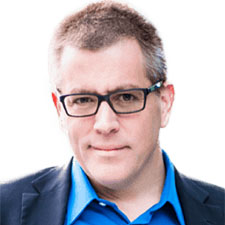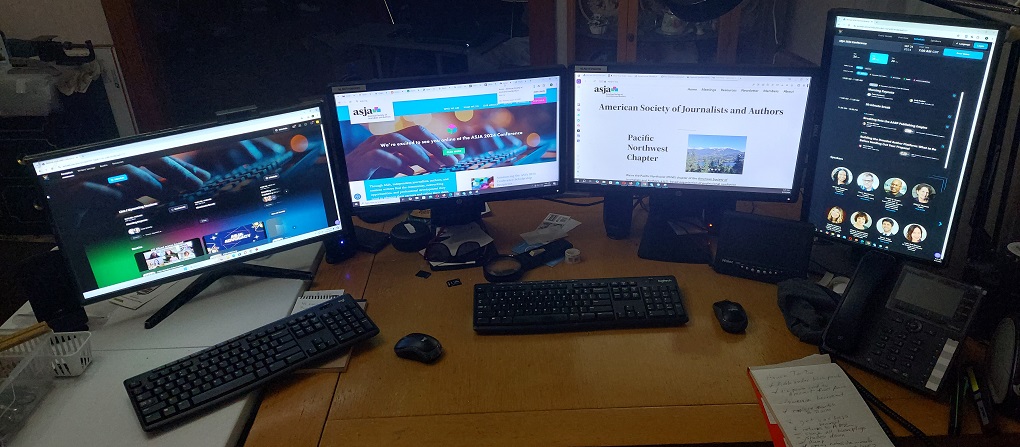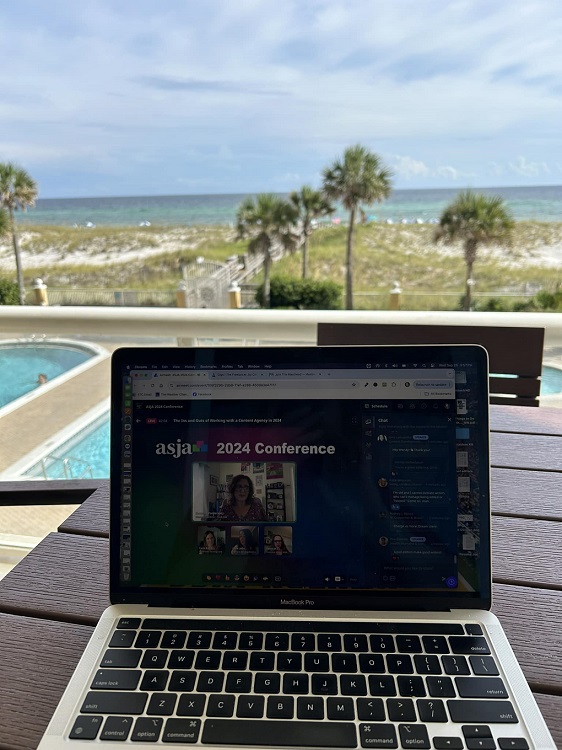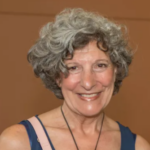
Peter Shankman isn’t a journalist anymore. But he still thinks like one. And he still believes in the profession’s ability to affect change – if journalists maintain their integrity, and don’t bend to popular pressure to create content for content’s sake.
“Stand up for what you believe in,” Shankman said in his keynote speech, which kicked off the second day of ASJA’s 2024 conference.
“There’s a reason you became journalists,” Shankman, a media entrepreneur, consultant, author, and founder of Source of Sources (SOS), told conference goers. “Never back down. If I care about what you’re writing about, I want to get behind you. Don’t get to the point where I can no longer do that. You don’t have anything if you don’t have your credibility.”
Shankman was one of a trio of founding editors of AOL News before moving into consulting and then running a PR firm. He became freelancer writers’ best friend in 2010 when he started Help a Reporter Out, a free matchmaking service that writers used to find sources and businesses, experts, academics, and nonprofits used to pitch themselves. Shankman ran HARO for three years before selling it for enough money to buy a Manhattan apartment to PR giant Cision, which retired the service earlier this year.
SOS and Shankman Hot Takes on Freelancing
Prodded by friends and acquaintances who used and loved HARO in its heyday, Shankman launched SOS last spring. Like the OG HARO, it’s free for writers, who fill out a form specifying the type of source they’re seeking. Requests are compiled and distributed via email once or more a day.
In less than six months, it’s grown to 25,000 users, Shankman said. He’s doing some of the work himself, including permanently barring bots and would-be sources that respond to queries off topic. “My goal is to bring credibility back to the way it was,” he said.
In his classic mile-a-minute presentation style, Shankman shared hot takes on a swath of journalism and freelancing topics:
- AI is never going to write as well as writers can. “If you’re a good writer, AI will make it easier to write even better” by doing things like helping you break a formidable project into manageable chunks.
- Get better at using tech and data. “The ability to interpret data is a good skill. The future will favor journalists who can merge data with narrative storytelling.”
- If you freelance for news sites, speed matters, but only if you’re right. “If you’re fast and wrong, people won’t come back.”
- Everyone has imposter syndrome. “You aren’t as bad as you think you are. You’re not doing worse than anyone else.”
- Freelancing is a hard way to make a living. But if it’s what you love “you can do it.”
Other Highlights from Day Two of the 2024 ASJA Conference
Sessions on the second day of the conference focused on many nuts and bolts of freelancing: how to pitch the biggest magazine in the country; factchecking as a skill and career; and SEO trends writers need to know now.
Pitching the AARP publishing empire. The combined reach and readership of AARP publications is staggering. The flagship publication of the organization for people 50 and older is AARP the Magazine, a general interest magazine that delivers service journalism with a light, aspiration, entertaining tone and has a circulation of close to 38.3 million—larger than any other publication in the country. AARP Bulletin, which focuses on less glamorous topics such as Medicare, Social Security, and taxes, has a circulation of almost 22.1 million. To keep up with changing preferences for how people get news and information, AARP is publishing more content online and through niche newsletter such as The Ethel and The Girlfriend.
Here are some of the top tips for pitching AARP publications shared by AARP staffers George Mannes, who edits personal finance and legal content, and Cori Vanchieri, who edits brain health content for the AARP.org site:
- Keep pitches to a few sentences. Don’t invest in an elaborate pitch in case a publication has something similar in the works, or has published a similar piece in the recent past.
- Get granular. Pitch stories, not ideas.
- Check pitch lead times by publication. Mannes assigns pieces for AARP the Magazine close to six months in advance, while Vanchieri could assign next-day pieces for breaking medical news.
- No rat studies or cover celebrities. If you’re pitching Vanchieri, don’t bother sending her anything related to animal studies. The celebrity profiles that grace every AARP the Magazine cover are handled by AARP “celebrity wranglers” in Los Angeles.
- Find AARP writers’ guidelines here.
Factchecking 101. If you aspire to work as a freelance fact-checker, be prepared to work on relatively tight deadlines, balance timeliness with efficiency and accuracy, and deal with an industry that still views the job as a gateway to higher paid work. That’s according to the professional fact-checkers and edits who hire them speaking at a session devoted to the subject.
Wudan Yan is a journalist who’s also worked as a fact-checker, and plans to launch a fact-checking service called Factual next month. Yan’s fact-checking clients include magazines, book authors, documentary filmmakers, and podcast producers. After 10 years in the business, she commands top dollar and often charges for fact-checking on a project basis, impressing on clients the value they get from a service that protects their reputation.
Top earners can earn $1,000 per podcast episode and $8,000 to $15,000 for factchecking a 70,000 to 80,000-word book, Wudan said.
A magazine such as Cancer Today, published by the nonprofit American Association for Cancer Research, pays $25 to $36 an hour for fact-checking work, according to Marci Landsman, the magazine’s editor. Cancer Research editors use fact-checkers with backgrounds in biology or other science topics, or for less complex topics, people who fact-checked as college interns or for general interest magazines.
What you need to know about SEO. Today it’s AI Overview, Google’s AI tool that summarizes search results and posts them at the top of the results page. Down the road it’s sure to be something else. Whatever the new SEO wrinkle is—especially for Google search—don’t feel overwhelmed. As with many other things in life, SEO change is constant, a panel of SEO experts shared. “It’s going to keep shifting and changing,” said Maggie Sullivan, director of SEO for TechTarget. “You need to learn how to pivot.”
To keep up with changes, Sullivan and other experts encouraged content writers who do SEO work to follow industry experts for news and advice. Among them: Lily Ray, an SEO strategist with a substantial social media following who USA Today recognized as the most influential SEO expert in 2022. Other sources: the WTF is SEO Substack, which is focuses on SEO for journalists; and Search Engine Roundtable.
Conference Computer Setups, ASJA Playlist, and Session Recordings


What’s your conference computer set up? Many conference goers are attending the event from a laptop in from their home office. A few have gone above and beyond. Bruce Miller, a tech-minded ASJA member in Seattle, is using a four-monitor set up so he can check email and monitor the conference schedule without scrolling away from the session stream. Karon Warren, an ASJA member from Ellijay, Georgia, is traveling on assignment and posted this photo of conference sessions she’s following on her laptop near the beach in Pensacola, Florida.
ASJA playlist. Listen to music when you work? Conference committee member Rita Colorito asked ASJA members for their favorite writing- and freelance-related songs and compiled the ASJA 2024 Virtual Conference Playlist on Spotify. Check it out here.
Session recordings. If you’re registered for the conference and missed a talk, recordings of all sessions will be available on the Airmeet platform until Nov. 30. Session recordings will be available to members who didn’t attend the conference and the general public at a later date.
Michelle Rafter is a Portland Oregon, business ghostwriter, ASJA’s publications chair, and part of the 2024-2025 conference planning committee.

